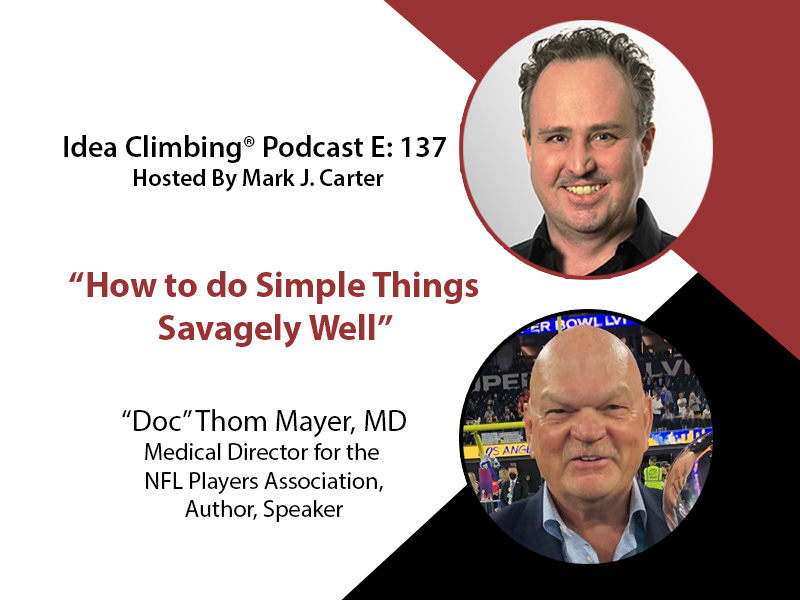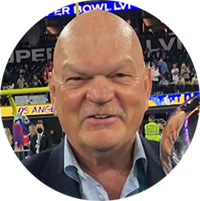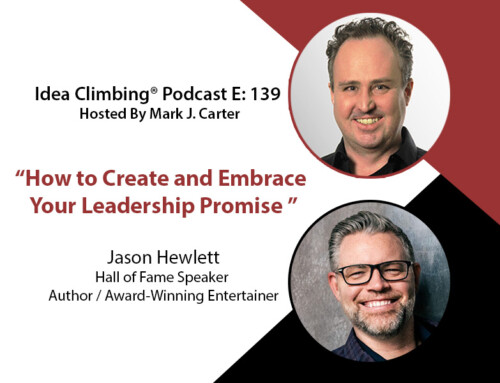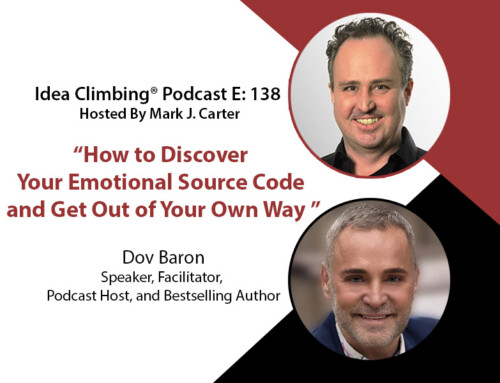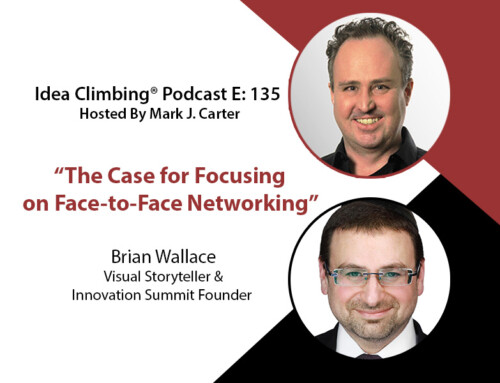Podcast: Play in new window | Download (Duration: 24:36 — 34.0MB) | Embed
Subscribe: Apple Podcasts | Spotify | Amazon Music | Android | iHeartRadio | RSS | More
Many self-help books and programs are overly complicated with dozens of steps or components. My guest, “Doc” Thom Mayer believes we can (and should) do simple things savagely well. We discuss how to do that in this episode.
Doc is the Medical Director for the NFL Players Association, as well as a prominent figure in the fields of emergency medicine, sports medicine and leading in times of crisis.
He has built a distinguished career focused on athlete and patient health, safety, emergency response, as well as the skills required to lead from the front lines, making significant contributions to clinical practice, medical education, and thought leadership.
Doc has always thought that we’ve made life more complicated than it really needs to be. It shouldn’t be as complicated as we’ve made it. And he believes all of us who are in the business of trying to help others, that’s his business, that’s your business, should simplify, simplify. Einstein said, “Simplify, simplify, but not too much.”
Doc’s great friend, Mark Verstegen is the founder of Team Exos. Team Exos is the best athletes’ performance company in the world. Had they been a country in the Paris Olympics, they would have finished sixth in the medal count. That’s how elite the athletes are and how diverse the sports world is that he’s involved with. And Mark is the one who said, “Do simple things done savagely well.” So, combining Einstein and Mark Verstegen, Doc has tried to do simple things done savagely well.
What Does “Too Simple” Mean?
An simple example of “too simple” is looking at the equation E equals MC squared. Energy equals mass times the square of the speed of light. When Doc learned that he thought, well, that’s awfully simple. I Why didn’t somebody come up with that before? The reason is that wasn’t the equation. It turns out the real equation is not that simple. The real equation is E equals MC squared divided by one, divided by the square root of one minus V (velocity) divided by C squared. Well, that’s a little more complicated.
So, some genius in marketing somewhere decided let’s just do E equals MC squared. So yes, simplify, but not too much. To simplify too much is when people fail to make the connections that are simple but have failed to be made because there’s all kinds of corollaries of logical consequences that come out of that.
How Do You Start to Simplify Something That’s Complex?
Doc says to start by taking something that is considered to be the status quo, thinking about it, reflecting on it, and starting to think, well, how do I put it to work? For example, Doc’s most recent book is titled “Leadership is Worthless, but Leading is Priceless, what I learned from 9-11, the NFL, and Ukraine”. Doc was in all those places. So, the simple idea is, leadership is worthless. How can that be? There’s 50,000 books on Amazon alone that have leadership in the title. The problem is that most leadership titles and advice include the 25 this, the 7 of this, the 14 things, and people can’t remember them. So, it’s not simplified enough.
So, to Doc, that contrarian idea is very simple. Leadership is worthless because it’s what you say. And anybody can say anything. They often do say a lot, tediously and at length, and usually about themselves. So leading is priceless because it’s what we do all day, every day. So, the simple thought is that leadership is worthless because it’s a noun, leading is priceless because it’s a verb, what we do. So Doc always tells his audiences, or anybody who will sit and listen, you must change the noun to a verb. Once you change the noun to the verb, life becomes so much more simple.
And therefore, new ideas are born, including the answers that are not above us in life, in an organization, in our family. They’re within and among us. The question that we should be asking ourselves is not am I, will I become a leader? You already are. You’ve got to say “Today I’m a leader.” Doc suggests abandoning the wistful, worthless word someday and embrace the word today, because that’s actionable. So, all simple, but contrarian.
Breaking Things Down into Lists vs. a Singular Idea
Doc says he’s OK with lists, but only if they’re lists of three. Any more than three, and most people aren’t going to be able to remember them.
No offense to everybody who’s got lists. He always says he doesn’t have a to do list. He has a to don’t list.
The reason is he can take care of it immediately so he doesn’t have to worry about it or think about it or put it on a list and come back to it at some point. There are things he simply doesn’t focus on or do.
We also dive into topics including:
- Why you need to figure out where your deep joy intersects with the world’s deep needs.
- Where burnout comes from and how simplifying your life can help you avoid burnout.
- How to combine your daily actions with longer term plans and goals.
- The definition and meaning of the phrase “savagely well”.
- How to execute your goals increasingly well.
- How to see and discover meaning and then pull the components of your life together.
- How to turn failure into fuel.
- A deeper dive into the root causes of burnout and how to address them in your personal and professional lives.
- How to pull out of downward cycles when you’re having a bad day.
- The importance of creating a cycle in your life of performance, rest, and then recovery.
- The definition of being “adaptile” and how to embrace it and practice it in your life.
- The importance of gratitude and ways to practice it every day.
- The one thing, above all else, that you need to do to do simple things savagely well.
…and other golden nuggets of advice!
You can get my book here: “Idea Climbing: How to Create a Support System for Your Next Big Idea”
Click here for more outstanding interviews with entrepreneurs and thought leaders!
About My Guest
“Doc” Thom Mayer, MD is the Medical Director for the NFL Players Association and Clinical Professor of Emergency Medicine at George Washington University and a Senior Lecturing Fellow at Duke University., as well as Executive Vice President for Leading for LogixHealth, which “Makes Intelligence Matter.”
He is one of the most widely-sought speakers on healthcare customer service, trauma and emergency care, pediatric emergency care, medical leadership, and sports medicine. He has published over 100 peer-reviewed articles, 100 book chapters, and has edited or written 25 textbooks on emergency medicine, including Leadership for Great Customer Service: Satisfied Patients, Satisfied Employees, Leadership for Smooth Patient Flow, Hardwiring Flow, and Strauss and Mayer’s Emergency Department Leadership: Principles and Applications.
Tom Peters, the internationally acclaimed leadership guru, has referred to his work as “gaspworthy.” Dr. Mayer was named the ACEP Outstanding Speaker of the Year in the second year the award was given and has twice been named ACEP’s “Over-the-Top” award winner.
